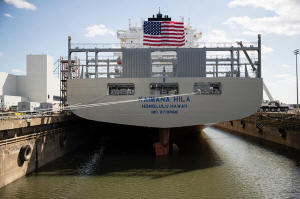China sanctions 5 US units of South Korean shipbuilder Hanwha Ocean over
probe by Washington
[October 14, 2025] By
CHAN HO-HIM
HONG KONG (AP) — China’s Commerce Ministry said Tuesday it was banning
dealings by Chinese companies with five subsidiaries of South Korean
shipbuilder Hanwha Ocean in the latest swipe by Beijing at U.S.
President Donald Trump's effort to rebuild the industry in America.
The ministry also announced that it was investigating a probe by
Washington into China’s growing dominance in world shipbuilding, and
threatened more retaliatory measures. It said the U.S. probe endangers
China's national security and its shipping industry and cited Hanwha's
involvement in the investigation.
The U.S. Trade Representative launched the Section 301 trade
investigation in April 2024. It determined that China's strength in the
industry was a burden to U.S. businesses.
“China just weaponized shipbuilding,” said Kun Cao, deputy chief
executive at consulting firm Reddal. “Beijing is signaling it will hit
third-country firms that help Washington counter China’s maritime
dominance.”
International shipping and shipbuilding have yet another areas of
friction between Washington and Beijing. Each side has imposed new port
fees on each others’ vessels that took effect on Tuesday.
South Korea and the U.S. have been building closer ties in shipbuilding
in response to China’s dominance as the world’s largest shipbuilder.

In late 2024, Hanwha Ocean acquired the Philly Shipyard in Pennsylvania
for $100 million. It announced in August that it plans to invest $5
billion in new docks and quays as part of its support for U.S. efforts
to restore globally competitive shipbuilding capacity.
Last year, Hanwha Ocean secured contracts with the U.S. Navy to perform
maintenance, repair and overhaul work for U.S. naval vessels.
The company said via email that “Hanwha Ocean is aware of the
announcement made by the Chinese government and is closely reviewing its
potential business impact on the company.”
Hanwha Ocean’s shares traded in South Korea fell as much as over 8% on
Tuesday, closing 5.8% lower.
In a statement to The Associated Press, South Korea’s Foreign Ministry
said the Seoul government was assessing how the sanctions might affect
the Hanwha companies and related South Korean industrial sectors.
[to top of second column] |

The Kaimana Hila at the Philly Shipyard in Philadelphia, on March
19, 2019. (AP Photo/Matt Rourke, File)
 The ministry said it will
“communicate with relevant ministries, industry representatives and
the Chinese side to minimize damages resulting from these measures.”
The sanctioned entities are Hanwha Shipping LLC, Hanwha Philly
Shipyard Inc., Hanwha Ocean USA International LLC, Hanwha Shipping
Holdings LLC and HS USA Holdings Corp.
A truce in the trade war between the world's two biggest economies
appears to have unraveled after U.S. President Donald Trump
threatened a new 100% tariff on imports from China, expressing
frustration over new Chinese export controls on rare earths.
The escalation of antagonisms raised doubts over whether Trump and
Chinese leader Xi Jinping will go ahead with a meeting planned for
late this month. But Beijing said on Tuesday that China and the U.S.
held working-level talks on Monday and have maintained
communication.
China said its new port fees would apply to ships owned by U.S.
companies or other entities or individuals, those operated by U.S.
entities including those having a U.S. stake of 25% or more, vessels
flying a U.S. flag and vessels built in the United States, mirroring
in many aspects the U.S.’s port fees on Chinese ships.
U.S. businesses represents just 2.9% of world fleet ownership by
capacity and 0.1% of global shipbuilding tonnage. Trump has vowed to
help rebuild the industry as part of his broader push to expand
U.S.-based manufacturing.
China accounts for more than half of all new shipbuilding, with
South Korea at about 30% and Japan just over a tenth of the total.
Hanwha Ocean said in May that it was withdrawing from a joint
venture in China.
All contents © copyright 2025 Associated Press. All rights reserved
 |